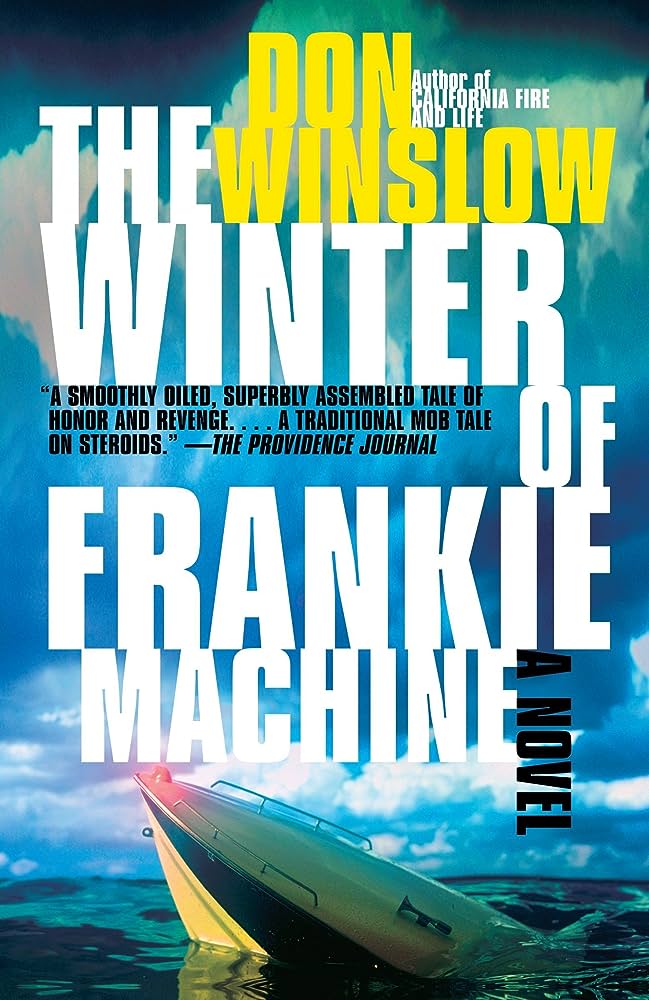One of my favorite new writers, “The Bear’s” Christopher Storer, chooses his big “level-up” project, aka, his first feature film.
Genre: Crime
Premise: A retired mob enforcer living the breezy surf life in San Diego is targeted by an unknown entity who wants him dead at all costs. But if you come for the Machine, you better not miss.
About: This project has a long history. Robert DeNiro was attached. After that, Michael Mann was attached. More recently, Matthew McConaughey was flirting with the project. It was recently raised from the dead again when The Bear’s Christopher Storer came on board. Word on the street is that Storer will work from the Brian Koppelman & David Levien draft they wrote for Martin Scorsese.
Writer: Don Winslow
Details: 300 pages

As we make the inevitable segue from hyper-femininity to hyper-masculinity, I must concede that I’ve never been the biggest fan of mob movies and their over-the-top displays of machismo.
If somebody looks at you the wrong way in these films, you shoot him in the face and exclaim with a big throaty yell, “Badaboom badabing, baby!” then walk out and get your family promotion, which entails managing more strip clubs or something. I struggle to figure out the appeal of such stories.
The only mob movie I truly love is Goodfellas. I admire The Godfather but I’ve always thought it was a bit slow. Believe it or not, I’ve never even seen past the first episode of The Sopranos.
So when I heard that The Bear’s Christopher Storer was going to be doing a mob movie for his first feature, my heart sank a little. Not just because I don’t like the genre. But because nobody does anymore. They don’t put these donuts in the oven these days because the audience has shrank to the size of a donut hole .
But you know what? Sometimes, when you go into something with the lowest of expectations, that’s when you’re most likely to be rewarded.
60-something Frankie Machine runs a bait shop on the San Diego coast. For all intents and purposes, he’s happy living the retired life. The problem is that the life he’s retired from doesn’t allow for the typical retirement plan. Frankie used to be the fiercest hitman in the business. That’s where he got his nickname, “The Machine.”
One day, Frankie is visited by a couple of low-level mob dorks who tell him that he’s been asked by the guys back in Detroit to meet with a gangster named Vince on his boat. Frank does a little reconnaissance. It checks out. So he goes to meet with Vince, only to realize he’s been set up. A 400-pound man tries to decapitate him, but even a 65-year-old Machine is immune from decapitation and shoots both his attempted killer and Vince dead.
The mob, we learn from Frankie, is complicated. There are different factions (San Diego, Los Angeles, The Valley, Vegas, Detroit) that are all interconnected with each other. Which means Frankie can’t just walk away from the botched hit and sell bait again. He has to figure out who wanted him dead, why, and then kill all the parties that are on that “Frankie sleeps with the fishes” chain.
What follows is a very complicated investigation with well over three dozen characters, all of whom are related, in some capacity, to those five factions. Along the way, we delve into Frankie’s past and how he started in the industry, rose up, and eventually became the most feared hitman on the planet. Ultimately, Frankie learns that this goes higher up than the mob, where ‘honor among thieves,’ the only thing allowing him to stay alive, doesn’t apply.

This book was a great reminder of the power of scene-writing.
Because, as I was reading through the first 40 pages of Frankie Machine, I was on the fence about whether I was going to continue. It wasn’t bad. But it was all setup. It was all how Frankie’s job worked. His love of surfing. His complicated romantic relationships. His daughter getting into college.
I still think that even professional writers make the mistake of going on cruise control with this stuff. They think, “You owe me your attention,” as opposed to the proper way to think as a writer, which is, “It’s my job and my job solely to keep you entertained.”
In the end, all of this information Winslow provides us is crucial because when Frankie gets set up, we wouldn’t care if we didn’t feel like he was a real person. And everything Winslow did to this point turned Frankie into a real person in our eyes.
But there are ways to offer this information in a more entertaining manner. While you have the right to lay it all out like a list, it’s better to build scenes that are entertaining where the byproduct is the character’s life.
As an example, if you wanted to establish your character’s day, you might show them go to the ATM to get some money for that day’s activities. You can do that alone with no drama whatsoever. Or maybe some guy shows up and cuts in front of your protagonist. Says he’s in a hurry so he’s sorry, even though he’s not.
Now you’re showing us your hero’s daily activity but doing so with a little storyline. How your hero reacts to that situation will tell us a lot about him. And I guarantee it’ll be more entertaining than him grabbing 200 bucks out of the ATM and we’re off to the next scene.
Luckily, Winslow’s big inciting incident scene finally arrives. And that’s when Frankie gets set up. When he walks onto that boat and a 400-pound man appears behind him and throws a wire over his neck and starts pulling, while we hear the two young mobsters run away, signifying that Frankie’s been set up, we feel this immense anger towards those guys, as well as these two men in the boat who try to kill him.
There are few better scenarios for making a character likable than having someone try to hurt them. So despite my issues with the non-entertaining setup throughout the first 40 pages, I still felt connected to this character due to that work and was very angry when these two tried to kill him. From that point on, I noticed a huge shift in my investment in the story. I was now determined to see Frankie take down whoever did this.
Not long after that scene, we get one of the most intense scenes I’ve read in a couple of years. Frankie is a young buc mobster just starting out, and he gets tasked with driving home the wife of a mob boss.
Things get tricky when said mob boss’s overly sexual drunk wife starts putting the Missus Robinson moves on Frankie. When he rejects her, she tells him that if he doesn’t sleep with her, she’ll tell her husband that he tried to. It’s a devastating situation for Frankie because if he sleeps with her, there’s a good chance the mob boss will find out and he’ll be killed. And if he doesn’t, the wife will tell her husband he tried to and he’ll be killed.
If the scene only covered the resolution of that quagmire, it would’ve been great. But it gets even more intense when both the mobster husband shows up as well as a senior mobster who Missus Robinson was flirting with all night to piss her husband off, who now wants to close the deal, and he doesn’t care that her husband is in the way.
What follows is not a scene that you’ll ever see written in 2023 (this book was written in 2006), and left me with my jaw permanently extended.
Those two scenes being in such close proximity to one another built up so much good will in the writing, that I was all in. Even if the rest of the book never quite reached those heights, mainly because it spent too much time in the past (the past always pauses the more important present storyline that your readers are there for) and there were sooooo many characters that it was hard to keep up.
But, again, the power that those two scenes had over me kept me invested in what was going to happen to Frankie all on their own.
Scene-writing, everybody. If there’s one skill that will provide massive dividends for you in screenwriting, it’s scene-writing. If you learn the mechanisms for writing a great scene (three acts, goal, stakes, urgency, conflict, unexpected developments, with clever uses of suspense, anticipation and/or dramatic irony) you’re basically unstoppable. Cause you don’t even need to worry about the larger picture. You’ve become a master at hooking the reader in the present. This is what Tarantino is so good at.
It’ll be interesting to see how Storer simplifies this. Cause there’s no way he can keep all these characters and all these mob divisions. But I’ll be there for whatever he does.
[ ] What the hell did I just read?
[ ] wasn’t for me
[x] worth the read
[ ] impressive
[ ] genius
What I learned: You should aim for 3 great scenes in your script. You know how the other day I was saying, try to make every scene at least an 8 out of 10. Well, three of those scenes should be 10 out of 10s. They’re the kind of scenes that you could imagine being talked about 30 years later. Coming up with great scenes is as hard as anything in screenwriting. But you should try. I’ll remember the Missus Robinson scene in Frankie Machine for the rest of my life. That’s the power that great scenes have over readers.
Also: Here are ten screenwriting lessons from The Bear!

